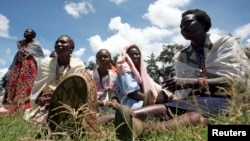Norah Chepkulul, a single mother of two young sons, stands outside her home, a grass thatched hut surrounded by cactus-like euphoria trees on the dusty Maasai Mara road in Kenya’s Rift Valley.
She has just finished milking her four cows and has asked the boys to keep an eye on the goats corralled in the little compound.
A few years ago, a single mother taking sole responsibility for her family would have been a rare sight among the pastoral Kipsigis and Maasai communities. Traditionally, in the predominantly herder societies men are the decision-makers and managers of land and stock.
But overgrazing and the sub-division and privatization of land and its transfer to agricultural use has forced herder communities to accept and adopt new land strategies, including applying for security of tenure and women in land transfer and inheritance.
Traditions rooted deep
“Getting married these days is no longer a priority,” Chepkulul told the Thomson Reuters Foundation.
“I am not married and being a single mother is not easy. I stay at home with my four children as a mother — and as a father, too.”
Deeply rooted obstacles in society, along with the big gap between new laws against gender discrimination and local custom and tradition however continue to be a problem for women.
Chepkulul, is one of the lucky ones. Her family defied cultural traditions.
“My family members saw the economic challenges I faced in bringing up my children, felt pity, and gave me a small portion of land to farm and put my house on,” she said.
“Sometimes when there is a financial challenge at home, for example hospital bills for the parents, you’re told to sell that cow and any other assets.
“For my brothers that is considered the last option — there is no equality at all. I wish they could realize that my children are the same as theirs.”
Changing attitudes
Local priest, Mathew Sigilai, believes that the combination of economic pressure and new gender equality laws in Kenya is slowly eroding deep-seated cultural beliefs.
“Things have changed and the population has grown and nowadays, getting married is not guaranteed,” he said.
“As a parent, if my daughter is not married, I will not chase her away. Instead I give her a farm or a cow to earn a living and start off her life like a son.”
Chepkulul’s neighbor, 56-year-old Juliana, recalls her youth, a time when things were even tougher for unmarried women.
“When you were not married, it was difficult to find accommodation or a home. You would not be allowed to stay with your parents. Sometimes a neighbor sympathized with you and offered you an old house,” she said.
“But later, when they wanted it back, you had to leave and find another place ... that was life for unmarried women, they were considered outsiders.”
Kenya discriminatory laws
A 2014 World Bank report, Gender at Work, showed that legal discrimination against women on inheritance and property rights remains common in many areas of the world, including the Middle East, North Africa, parts of South Asia, and sub-Saharan Africa.
However, between 1960 and 2010, the report said, Kenya had slashed the number of discriminatory laws against women’s property ownership and rights by more than half.
Room for improvement
Purity Wawerua, a retired Kenya Wildlife officer who belongs to a different tribe agreed there had been important progress in women’s inheritance rights among the Maasai.
Land used to be a major source of disputes, particularly after long marriages ended in divorce, she said.
“When [the woman] goes back to her parents’ home, it becomes a problem,” she said. “Thanks to the new Kenyan constitution, equal rights are given to both genders.”
However, according to Mitchelle Oyuga, of the Federation of Women Lawyers in Kenya (FIDA-Kenya), there is still room for improvement.
“People have become quite aware that children are equal and it’s a provision in the new constitution,” she said.
“You are allowed to farm, to do any kind of work on that farm, but when it comes to selling the farm, women are given secondary rights,” she said.
The most difficult hurdle
At her home in the Rift Valley, Chepkulul agrees and says that speaking up for themselves remains the most difficult hurdle for many women.
“When you despair you feel like speaking out but no one can understand what you’re going through,” she said. “Sometimes I have been thinking ... that if God had really created human beings equally, there would be no discrimination on gender and all people would have been the same.”





